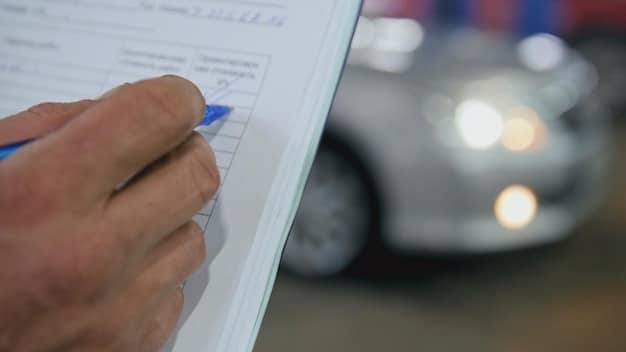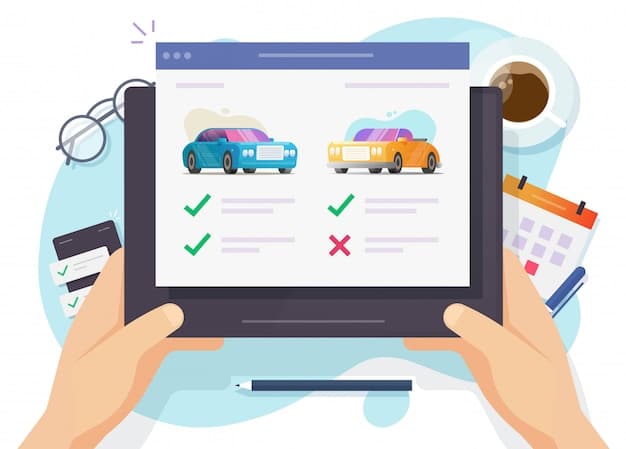Buying a Car Out of State in 2025: Tax and Registration Guide

Buying a car out of state in 2025 involves navigating different state regulations, taxes, and registration processes, requiring careful planning to avoid unexpected costs and ensure legal compliance.
Planning on buying a car out of state in 2025? It’s a decision that can save you money or offer access to a wider selection of vehicles, but it also comes with unique challenges. Let’s explore everything you need to know to make a smart purchase.
Buying a Car Out of State: Initial Considerations
Purchasing a vehicle from a dealership or private seller in another state might seem straightforward, but several factors come into play. These include variations in sales tax rates, registration requirements, and emissions standards. Careful planning is essential to a smooth transaction.
Researching State Regulations
Before even setting foot in another state, thoroughly research the regulations of both your home state and the state where you intend to buy the car. Understanding these rules is the first step in avoiding complications.
Checking Emissions Standards
Certain states have stricter emissions standards. Ensure that the vehicle you plan to purchase meets your home state’s requirements. Failing to do so may result in an inability to register the vehicle.
- Verify emissions standards for both states.
- Check for any specific inspection requirements.
- Obtain necessary documentation from the seller.
Buying a car out of state requires homework. Knowing rules beforehand will save time and money and will provide a clear path forward.

Sales Tax Implications
Sales tax is a primary concern when buying a car out of state in 2025. States handle sales tax differently for out-of-state purchases. You might pay sales tax in the state where you buy the car, your home state, or both, depending on the reciprocity agreements in place.
Understanding Reciprocity Agreements
Some states have reciprocity agreements, which may allow you to avoid paying sales tax in the purchase state. Instead, you would pay sales tax only in your home state when you register the vehicle.
Calculating Sales Tax
If there’s no reciprocity agreement, you might have to pay sales tax twice—once in the state of purchase and again in your home state. Some states offer a credit for taxes paid out of state. Be sure to calculate your total tax liability before committing to the purchase.
- Check for reciprocity agreements between your state and the seller’s state.
- Understand the sales tax rates in both states.
- Inquire about credits for taxes paid out of state.
Properly understanding sales tax implications is crucial. It prevents unpleasant financial surprises and ensures you’re budgeting accurately for your new vehicle.
Registration and Titling
Registering and titling your newly acquired vehicle involves providing the correct paperwork to your local Department of Motor Vehicles (DMV). Requirements can vary, so it’s vital to prepare by knowing exactly what the DMV needs.
Required Documentation
You will generally need the bill of sale, the vehicle’s title (or certificate of origin for a new car), proof of insurance, and identification. Some states may also require an inspection certificate.
Navigating the DMV Process
The process might involve visiting the DMV in person, and some states offer online registration. Be prepared for potential wait times and ensure you have all the necessary documents to avoid delays.
Understanding the registration and titling step is important for new car owner. Proper preparation provides a smoother DMV experience.
Financing and Insurance
Financing and insurance are integral parts of the car-buying process. When buying a car out of state in 2025, coordinate your financing and insurance with your lender and insurance provider.
Securing a Loan
Obtain pre-approval from your bank or credit union. Out-of-state purchases may require additional documentation or have specific loan requirements. Communicate with your lender to ensure a smooth approval process.
Getting Insurance Coverage
Contact insurance provider for coverage before driving the vehicle home. Most states require insurance coverage from the moment you take ownership. Not doing so can result in fines or penalties.
- Obtain pre-approval for a car loan.
- Inform your lender and insurance provider about your out-of-state purchase.
- Ensure you have insurance coverage before driving the car home.
Getting financing and insurance provides security throughout the car buying process. Coordinate effectively to avoid complications.

Inspections and Compliance
Several states require vehicle inspections before registration. Compliance with emissions or safety standards is mandatory. Understand these factors to avoid issues.
Safety Inspections
Many states require a safety inspection to ensure the vehicle meets minimum safety standards. This includes checking the brakes, lights, and other safety components.
Emissions Testing
States with strict emissions standards require an emissions test to ensure the vehicle complies. Schedule an inspection at a certified testing center.
Doing these actions will allow you to register the car with confidence.
Negotiating the Deal
Negotiating the price, trade-in value, and any additional fees is crucial. Remember that buying a car out of state in 2025 offers you the advantage of comparing prices across different markets.
Researching Market Value
Research the market value of the vehicle to ensure you’re getting a fair price. Online resources can provide valuable information about pricing trends and average costs.
Negotiating with the Seller
Negotiation is a dance. Remain polite and informed. Don’t hesitate to walk away if you feel the seller isn’t offering a reasonable deal.
- Research market values for the vehicle.
- Compare prices from different dealerships.
- Be prepared to negotiate effectively.
Negotiating effectively helps ensure you receive a great deal. Having the proper information and a well planned strategy is key in getting the best value possible.
| Key Point | Brief Description |
|---|---|
| 🔍 Research | Investigate tax and registration rules in both states. |
| 💰 Sales Tax | Understand where and how much sales tax you’ll pay. |
| 🛡️ Compliance | Ensure the vehicle meets all required safety standards. |
| 🏦 Financing | Arrange loan and insurance before you buy. |
FAQ Section
▼
It depends on the reciprocity agreements between your home state and the state where you purchase the vehicle. Check with your local DMV to understand the rules.
▼
Typically, you’ll need the bill of sale, the vehicle’s title, proof of insurance, and your driver’s license. Additional documents may be required depending on the state.
▼
Many states require a safety or emissions inspection before registration. Check your state’s DMV for their inspection requirements.
▼
Yes, securing pre-approval for a car loan is a smart move. It will make the purchase smoother. Contact your bank or credit union.
▼
Confirm insurance before driving the new vehicle home is important. Contact insurance provider to address your coverage. Ensure that you are covered.
Conclusion
Buying a car out of state in 2025 offers potential benefits, but comes with its own complexity that necessitates thorough preparation. Understanding the registration requirements, sales tax implications, and compliance standards ensures a smooth purchase process. Conduct the proper research to make an informed decision.





